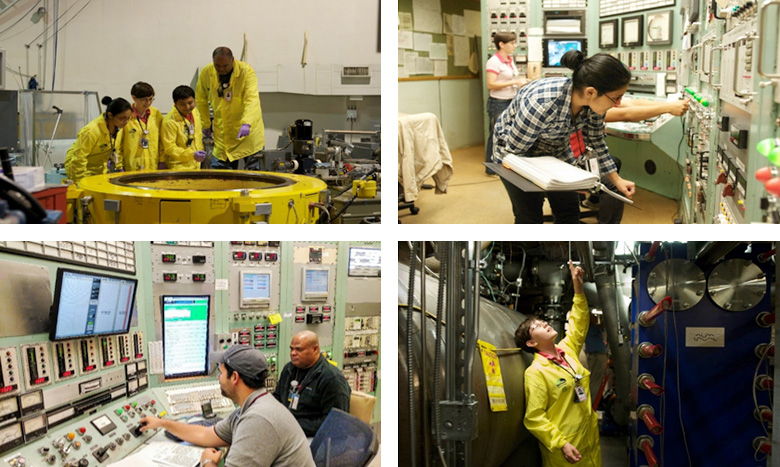Operator Training
Apply to Be a Student Operator
Being a Student Operator at the NRL is an exciting opportunity where you'll play a crucial role in operating and maintaining our 6 MW research reactor. As a student reactor operator, you'll receive extensive training and have the chance to work with intricate systems that have a mix of analog and digital technology. Not only will you have the unique experience of operating a nuclear reactor, but you'll also have an intellectually stimulating, well-paying job on campus.
Student operators earn $16/hour (students get paid while training for their license) and enjoy a stable income until graduation. We're particularly interested in local college freshmen and sophomores who can commit to this role for multiple years. If you choose to advance, you can pursue a Senior Reactor Operator’s license, becoming a Shift Supervisor with an hourly wage increase of 25%.
You don't need a background in nuclear science or engineering to join us. We'll provide comprehensive training covering mechanical and instrumentation systems, nuclear science, operational procedures, radiation safety, and health physics.
When hired, student operators start with a year of training, which involves part-time hours (~10 hours/week) during school semesters and full-time work (40 hours/week) during the first summer. Subsequent IAPs and summers are optional to work up to 40 hours/week.
Once licensed, you'll typically support two shifts a week (~16 hours/week) with flexible scheduling around your classes. Whether it's during Nights (12am-8am), Days (8am-4pm), or Swings (4pm-12am), we'll work together to accommodate your availability.
Application process
- Send us your resume, cover letter, and three references through this Dropbox link before
Saturday, October 21st:UPDATED APPLICATION DEADLINE: Saturday, October 28th https://www.dropbox.com/request/fu78Gf0QBtsxHyxDltxm- For your references, please include their names, phone numbers, email addresses, and relationship to you. Cover letters can be addressed to "NRL Hiring Committee." Make sure your name is on all documents or in the file name if uploading them separately
- Expect an interview and a facility tour (if you haven't toured yet)
- References will be contacted after the interview
- Our Training Supervisor will guide you through onboarding and set a training start date
- The application deadline is
October 20thOctober 28th with interviews held in late October and early November, decisions made by November 17th, and onboarding set for after MIT's Thanksgiving break.
We can arrange a Zoom call with a current student operator to share their experiences with you, email reactor-job@mit.edu to request to set one up. Email us with any questions you have about the position or application process, but please use the Dropbox link to apply.
About
The MIT Nuclear Reactor Laboratory employs and trains a select number of MIT and other local college students each year to become fully qualified NRC-licensed reactor operators. The training process involves gaining a broad and deep knowledge of the reactor systems and how they affect each other, and operation of the reactor. Trainees spend several months reading about the reactor systems and drawing components to help them understand how everything is connected. When the trainee has gained sufficient knowledge of the reactor they start to operate the reactor under direct supervision from the training supervisor. Trainees learn to operate the reactor by performing startups, shutdowns, power manipulations and control blade shuffles. Much like driving a vehicle, learning how quickly the reactor responds to control blade movement and temperature change can only gained by practice.
Once the trainee has demonstrated the ability to operate the reactor safely, including responding appropriately to abnormal conditions, the trainee applies for their license. The license exam is conducted over two days by an NRC examiner and includes a multiple-choice written exam, an interview, a tour of the reactor and a reactor startup. If the trainee passes the exam then they become a licensed Reactor Operator (RO). This license only allows the holder to operate the MIT reactor. If the operator moves to a different reactor, they must become relicensed for that specific plant. For that reason, we do not offer any operator training for those who are not employed at our facility.

Top left: Identifying core components; Top right: Practicing startup-up checks; Bottom left: Practicing a reactor startup; Bottom right: Tracing the cooling systems in the equipment room.
A reactor operator may choose to upgrade their license to a Senior Reactor Operator (SRO) license. This requires additional experience operating the reactor, training, and another exam. An SRO license allows an operator to act as the shift supervisor which has the added responsibility that they oversee operations on a given shift and make sure that any work is completed sufficiently and safely.
